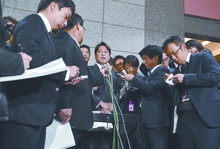 Source: japanese.china.org.cn
Source: japanese.china.org.cn In a press conference at the Chinese Ministry of Foreign Affairs on Wednesday, China’s diplomatic arm stated that it was investigating the background of the incidents to determine whether Japan’s protests were factually based, which essentially implied that the Ministry had no idea that they had taken place(J). This raises a particularly worrying question which stems from comments made in the Japanese defence white paper of 2012. In the paper, it stated that there were elements within the PLA which are inclined to act unilaterally and influence foreign policy without recourse to other government organs (as analysed here). The fact that the Ministry of Foreign Affairs publicly stated it had no idea what the PLAN were doing or had done five months previously gives further credence to Japan’s analysis of China’s internal dynamic, and suggests that should an incident occur near the Senkaku Islands, China’s diplomatic arm will be forced to react to a situation without warning thereby undermining its credibility with foreign governments.
It appears that this act of provocation on the part of the PLAN was an attempt to test the reaction of the US to any threat to Japan’s control of the Senkaku Islands, as well as testing the resolve of the Abe Cabinet and its claims to sovereignty over the island. If Japan had retaliated, China could claim it was the victim of Japanese aggression, a position the domestic Chinese media has been promoting over the last few months in anticipation of the Abe cabinet’s accession to power (E). The PLAN could then point to the need for greater naval surveillance of the islands to ward off Japanese attacks on Chinese vessels, and that any subsequent retaliation by China against Japan would be justified by Japan’s initial act. The Central Committee would find its options for negotiating with Japan reduced, for domestic anger directed at Japan (and the US as Japan’s principal ally) would demand tough rhetoric on the part of Xi Jinping and other senior members of the Central Committee. Far from being able to dictate events, the CCP would find itself being drawn into a conflict propagated by the PLA, the outcome of which would have dire consequences for the region.
The role of the military in forcing the hand of government is a phenomenon that is centuries old and confined to no specific continent or society. The acts of the PLAN indeed do bring to mind those of officers within the Imperial Japanese Army in the prelude to the Mukden Incident of September 18, 1931. In that instance, an act of sabotage perpetrated by army officers, with the tacit approval of their commanders, served as a pretext for the invasion of Manchuria. What the PLAN did off the Senkaku Islands could therefore be regarded as a Mukden-like Incident in reverse, providing justification for military action on the basis of overt hostility on the part of Japan. Like the Mukden Incident it could provoke a wider conflict, with global bodies powerless to intervene as the states involved harden their stance and resent any resolution that would weaken their claims to sovereignty and right to self defence.
In all, it is a disturbing development, and hopefully there will be no repeat of it.
As for the news of an incursion of Japanese airspace by two Sukhoi Su-27 aircraft on Thursday, more on this in the next post.
 RSS Feed
RSS Feed